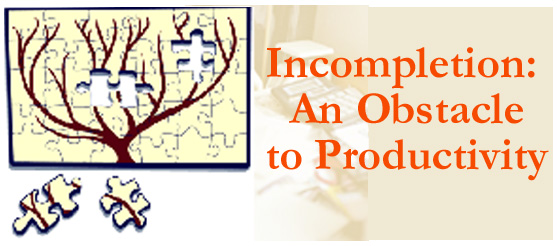 |
|
|
|
|
|
Our survival and our prosperity as entrepreneurs depend on living up to the challenge. And the challenge in any business is to gain customers and satisfy their needs. A key ingredient in this demanding process is productivity. I define productivity as the ability to take action that generate intended results. These outcomes also need to be realized without expending too mahy resources--money, time, and sprit. I have seen business owners waste lifeblood energy on fnacy brochures, advertising and attending expensive meetings to attract customers. Reaching out to customers is only one part of the selling equation; the other parts are getting customers to come to you, and then delivering the goods. I will recommend some practices that will help you make solid connections with clients and meet your own expectations, and theirs. But first, we need to recognize that the world of work has changed dramatically. In earlier times on the farm and on the assembly line, work was more taxing physically, but it was easier to tell what was already done and what was still left to do. Either the pile of wood was an even cord or it wasn't. Nowaeays, the workplace is like a traffic circle with many feeder lanes and not enough exit points, so the amount of tasks keep accumulating and the pressure to manage them all intensifies. One of the biggest impediments to success is the gap between the number of tasks that are done compared to those undone. The modern condition in business is to be overwhelmed. There is too much work to do in a given time. In addition, the line between person and professional is so thin that it is indistinguishable. Trips to take, movies to see, books to read, weight to lose, technical skills to learn, a yearning for improvement that gets thwarted from being too tired. There are so many things that one would like to do that never get done. some of my clents get 250 e-mails a day. I consult to businesses which operate under such severe deadline pressures that even a slight interruption in workflow means trouble. We have so many projects to do that there is not a lot of space left on the backburner. If the difference between done and undone is too big, undue stress is created and the mental energy that is needed for concentration and follow through is lost. Relaxation is the key to productivity, but the mind will not rest easy if it knows that there are too many open-ended obligations in one's life. The human mind is funny, it can't quite remember all the commitment details and at the same time, it won't let you forget them altogether. So, the sense of incompletion generates more stress then poeple realize, and it is often hard to tell what needs to be done next and whether the work already done is complete. I define incompletion in a number of ways:
Here are some practices to help you manage your mind and reduce the stress of loose ends. |
|
|
About the Author Christos J. Gianopoulos, M.A., M.P.A., has achieved results in his own life and in the lives of many business and organizational leaders. As a consultant, Christos has assisted business professionals and other committed individuals to clarify their thinking about the direction and management of their enterprises. Christos has decades of experience in personal and professional development, leadership of community initiatives, and teaching. Christos is a Registered Counselor in the State of Maine. This article is reprinted with permission from The Employment Times (7 November 2005, Vol. 7, Issue 45, pp. 6 and 21). HCS readers who have enjoyed this article by Christos Gianopoulos, may wish to view other articles and releases in our permanent, extensive archives at the URL http://www.helleniccomserve.com/contents.html. |
|
 |
|
|
2000 © Hellenic Communication Service, L.L.C. All Rights Reserved. http://www.HellenicComServe.com |
